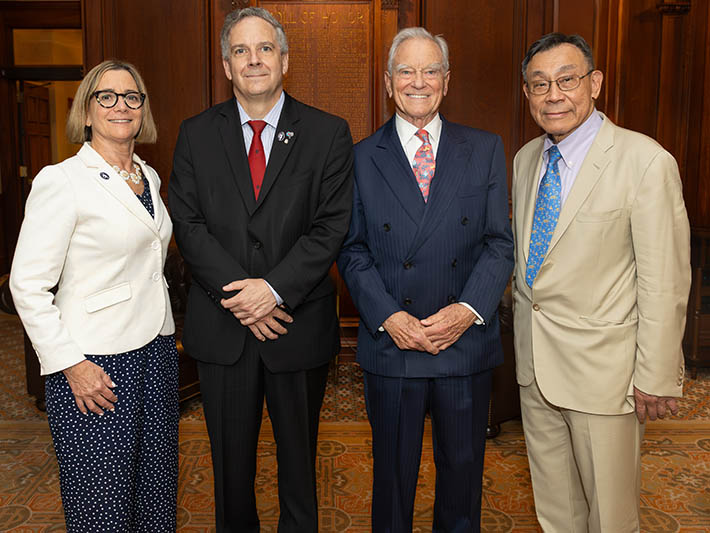Joslin Diabetes Center’s Beetham Eye Institute has revolutionized treatment for diabetic eye disease, dramatically improving the prognosis for individuals affected by this condition. Recently, a remarkable gift from longtime Joslin patient and former Board of Trustees member Charles “Charlie” Downer, helped establish the first endowed chair in Ophthalmology at Joslin—the Charles Webster Downer Professorship in Ophthalmology. This endowed Harvard Medical School (HMS) position honors incumbent Lloyd Paul Aiello, MD, PhD, Beetham Eye Institute Director. Aiello carries on the legacy of his father, Lloyd M. Aiello, MD, Founding Director, and grandfather, William P. Beetham, MD, for whom the institute is named. The Joslin and HMS communities were delighted to celebrate the new appointment with a ceremony featuring remarks from George Q. Daley, MD, PhD, Dean of HMS, as well as Joslin leaders Roberta Herman, MD, President, and George King, MD, Chief Scientific Officer. Aiello and Downer also spoke at the event.
Downer first came to Joslin as a patient over 50 years ago. Following his diagnosis, regular eye exams became a routine part of his treatment. “At that time, diabetes was the leading cause of blindness in the U.S., and that terrified me,” he says. Regular check-ups with Aiello helped ease his concerns, and he also developed a deep appreciation for Aiello’s research, which builds on the innovative work of both his father and grandfather. “I was full of admiration for both Drs. Aiello and Dr. Beetham,” says Downer. “They are an amazing family, and what they have done collectively for people with diabetes is incredible.”
Aiello’s father and grandfather pioneered a laser surgery technique that initially reduced blindness by 50 percent and can now reduce blindness by more than 95 percent. Aiello has followed in their footsteps, making breakthrough discoveries that have transformed outcomes for individuals with diabetic eye disease. Notably, he, Dr. King, and other colleagues were the first to demonstrate that blocking a protein called vascular endothelial growth factor (VEGF) improves vision, reduces diabetic eye disease severity, and prevents further vision loss. Anti-VEGF drugs are now a standard of care for diabetic eye disease, as well as other conditions, including macular degeneration. In addition to improving treatments, Aiello and his father both worked to make care more accessible and were early adopters of telehealth dating back decades. “Thanks to them, hundreds of thousands of people have had the good fortune to have their eyes treated by Joslin, no matter where they are in the world,” says Downer. “It’s pretty extraordinary.”
Aiello is grateful for Downer’s partnership in advancing the institute’s leading-edge work. “This chair provides a level of support that will meaningfully accelerate innovation and support clinical excellence, while also elevating our institute,” he says. Gifts like Downer’s play an important role in attracting top talent and helping to bring together experts to address the multiple facets of diabetes—something that makes Joslin unique. “The collaboration that happens here is literally transforming the delivery of medicine—and ultimately patient outcomes,” says Downer. Joslin’s partnership with the Beth Israel Lahey Health system and its affiliation with Harvard Medical School (HMS) also provides valuable access to subject-matter experts. The connection with HMS is especially meaningful to Downer, who received his undergraduate degree from Harvard College and MBA from Harvard Business School.
Downer is thrilled by the tremendous progress that has been made in treating diabetic eye disease in such a short period and looks forward to what the future holds. “Here at Joslin, we’ve worked together to develop new approaches that previously would have been considered miracles,” says Aiello. “Wonderful things can happen when you have a dedicated team with a vision and the support of generous individuals like Charlie.”
